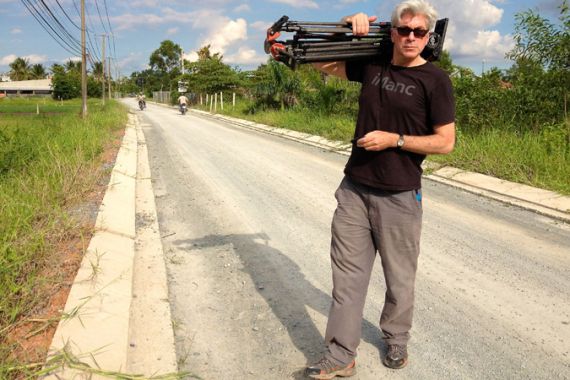
Paul Sapin: ‘It was born out of a brutal war’
The filmmaker tells how he found out that ‘Operation Babylift’ was not the humanitarian effort it had been presented as.
In the film So Close, So Far Away Al Jazeera’ Cath Turner explores the psychological effects of transnational adoption of thousands of Vietnamese babies, during the post-war ‘Operation Babylift’. We sat down with filmmaker Paul Sapin to find out what motivated him to make a documentary on this deeply personal story.
Al Jazeera: A lot of films and documentaries have been made about the Vietnam War and ‘Operation Babylift’. What made Cath’s story different? What attracted you to this documentary?
Keep reading
list of 4 itemsUK returns looted Ghana artefacts on loan after 150 years
Fire engulfs iconic stock exchange building in Denmark’s Copenhagen
Inside the pressures facing Quebec’s billion-dollar maple syrup industry
Paul Sapin: The Vietnam war makes for such a powerful chapter in contemporary history that it is hard to believe you could ever exhaust mining stories from this era. And that is no less true about the aftermath of the war.
‘Operation Babylift’ was a huge part of that period, and because it touched so many thousands of lives, and continues to have an impact, there is still much to be said about the people involved in this event.
I doubt there are any two stories the same. So, looking at Cath’s story was inevitably going to involve looking at some experiences shared by others, but a chance to explore real individual differences too. That made the prospect of making this film exciting.
Plus, I had seen Cath on the news. She has a strong and charismatic presenting style, and conveys the impression she is unafraid and prepared to get stuck in to the search for people and places to piece together her past.
It made for a filmmaker’s dream.
What are the main themes and questions you wanted to raise?
I wanted to understand why Cath wanted to make this film, and what purpose she felt it could serve for her and others.
And I wanted to find out more about what motivated ‘Operation Babylift’. I found it difficult to believe that this operation could be entirely altruistically driven given that it was born out of such an immoral and brutal war.
And that was the case. ‘Operation Babylift’ was not quite the epic humanitarian effort the world has been led to believe.
There is a political element to the documentary regarding the war. Why did you include that in this documentary?
Cath is a war baby. Wars are political by nature, and the Vietnam war exemplified cold war politics in a particularly stark way. So, you could not help but feature this element.
What none of us were aware of before the film was made were the cynical agendas that motivated several of the architects of ‘Operation Babylift’. It seemed imperative to both Cath and me that this issue be raised.
Most Al Jazeera viewers know Cath from her news reporting but this is her personal story. Was it a challenge to get her to open up about her private life?
Yes, it was difficult for Cath to open up from time to time. That is understandable. We were asking her to be frank about details of her life that are deeply personal. We put her in emotionally challenging situations because, in no small way, the story demanded Cath’s responses to these emotionally charged circumstances.
The great and impressive thing is Cath never flinched from staring these demons down.
Occasionally the journalist in her would prevail, and she would closely question me as to why we were shooting certain people or scenes.
But she never said no, she never gave up. And I think the film is a tribute to her fortitude and determination to understand this period and her past.